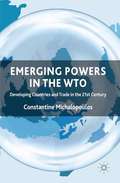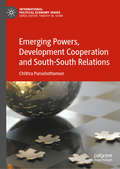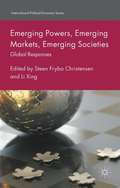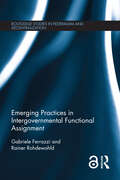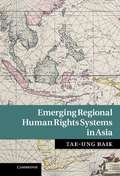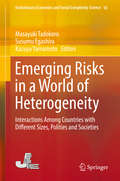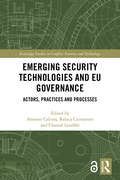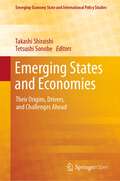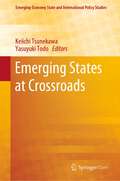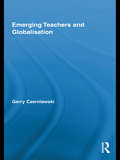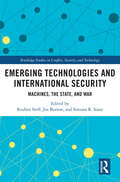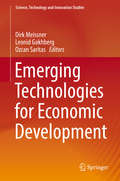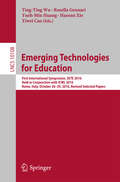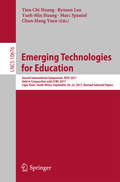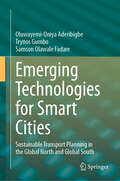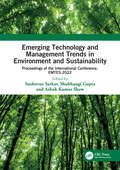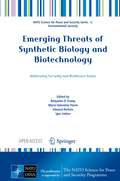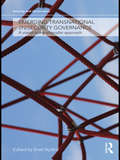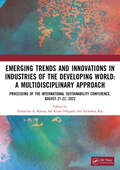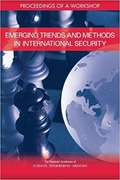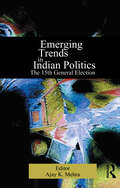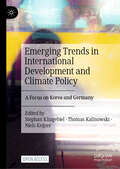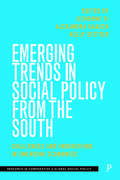- Table View
- List View
Emerging Powers in the WTO
by Constantine MichalopoulosThe most important dimension of globalization in the last thirty years and especially since 2000 has been the dramatic increase of developing country participation in world trade and the emergence of a number of powers such as Brazil, China and India that are playing an important role in the global economy and in the WTO. But many other developing countries continue to struggle to transform their economies, handicapped by institutional constraints and protection against their exports both in developed and developing country markets. This volume examines the main factors for developing country trade performance in the last thirty years, their own trade policies, market access issues they face, and their increasingly more effective participation in the WTO and the Doha Round of multilateral trade negotiations. The last part addresses the future role of the WTO in the international trade system in connection with the challenges it faces from the multitude of preferential trade agreements such as the Transatlantic Trade and Investment Partnership between the US and the EU; and recommends an action program for the more effective participation of developing countries in the world trade.
Emerging Powers, Development Cooperation and South-South Relations (International Political Economy Series)
by Chithra PurushothamanThis book analyses the role of emerging powers as a development assistance providers and the nature of their development cooperation, their behaviour, motives and markedly their changing identities in international relations. With their growing economic and political clout, emerging powers are using economic instruments like foreign aid to ensure their position in the international system that is going through power shifts. By comparing three major emerging economies of the Global South- Brazil, India and China- this book would explore how emerging powers are changing the international aid architecture that is created and dominated by the traditional donors.
Emerging Powers, Emerging Markets, Emerging Societies: Global Responses (International Political Economy Series)
by Li Xing Steen ChristensenThe rise of emerging or new powers has recently become one of the most researched areas in International Relations. While most studies focus on relations between traditional and emerging powers, this edited collection turns the focus 180 degrees and asks how countries outside these two power sets have reacted to the emerging new world order. Are emerging powers creating a united front in a struggle to change the global order, or are they more concerned with national interests? Are we seeing major changes in the global order, or simply an adjustment by the traditional powers to the emergence of new contenders? In order to the answer these questions, the authors take a broad thematic approach in analyzing recent trends in the interplay between states, markets and societies, concentrating in particular on Latin America, Africa, the Middle East and Europe, and on the three major emerging powers: China, India and Brazil.
Emerging Powers, Global Justice and International Economic Law: Reformers of an Unjust Order?
by Andreas BuserThe book assesses emerging powers’ influence on international economic law and analyses whether their rhetoric of reforming this ‘unjust’ order translates into concrete reforms. The questions at the heart of the book surround the extent to which Brazil, Russia, India, China, and South Africa individually and as a bloc (BRICS) provide alternative regulatory ideas to those of ‘Western’ States and whether they are able to convert their increased power into influence on global regulation. To do so, the book investigates two broader case studies, namely, the reform of international investment agreements and WTO reform negotiations since the start of the Doha Development Round. As a general outcome, it finds that emerging powers do not radically challenge established law. ‘Third World’ rhetoric mostly does not translate into practice and rather serves to veil economic interests. Still, emerging powers provide for some alternative regulatory ideas, already leading to a diversification of international economic law. As a general rule, they tend to support norms that allow host States much policy space which could be used to protect and fulfil socio-economic human rights, especially – but not only – in the Global South.
Emerging Practices in Intergovernmental Functional Assignment (Routledge Studies in Federalism and Decentralization)
by Gabriele Ferrazzi Rainer RohdewohldAttaining the benefits of (especially fiscal) decentralization in government remains an enduring challenge, in part because the re-arrangement of public functions across levels of government has often been carried out poorly. This book aims to provide a firmer conceptual basis for the re-arrangement of public functions across levels of government. In doing so, it offers practical advice for policy makers from developing and emerging countries and development cooperation practitioners engaged in such activity. Combining a theoretical approach for inter-governmental functional assignment with an in-depth analysis of real-life country cases where functional assignment (FA) has been supported in the context of international development cooperation, it underscores the common technical and political challenges of FA, and also demonstrates the need to expect and support country made and context-specific solutions to FA processes and results. Examples are drawn from a number of developing/transition countries from the Asia-Pacific region, Africa and the OECD, which outline and suggest advisory approaches, tools, principles and good practices and approaches. This text will be of key interest to scholars, students, policy-makers and practitioners in public policy, decentralization, local governance studies, public administration and development administration/studies.
Emerging Regional Human Rights Systems in Asia
by Tae-Ung BaikAsia is the only area in the world that does not have a human rights court or commission covering the region as a whole. However, a close look at recent developments in the region, especially in East Asia, shows that a human rights system is emerging. Various activities and initiatives for human rights cooperation are developing in Asia at the regional, sub-regional and national levels. Since the establishment of the ASEAN human rights body (AICHR) in 2009, the need for a review of the regional human rights mechanisms in Asia is stronger than ever. With a primary focus on twenty-three East Asian states, Tae-Ung Baik highlights the significant changes that have taken place in recent decades and demonstrates that the constituent elements of a human rights system (norms, institutions and modes of implementation) are developing in Asia.
Emerging Risks in a World of Heterogeneity: Interactions Among Countries with Different Sizes, Polities and Societies (Evolutionary Economics and Social Complexity Science #10)
by Masayuki Tadokoro Susumu Egashira Kazuya YamamotoThis uniquely interdisciplinary volume analyzes the challenges posed by the heterogeneity of the world where radically different players are crammed into increasingly limited political, commercial, social, and ecological space. The rapid rise of Communist Party-ruled China is posing serious challenges to the postwar politico-economic architecture dominated by the United States. Russia, once expected to become a partner of the liberal Western international order, has started behaving in an increasingly unilateral fashion. The developing world is more characterized by failed governance rather than convergence to liberal democracies as was hoped by many Western authors. Given links provided by low-cost carriers, the Internet, and trade and investment, we simply cannot shield ourselves from influences, whether benign or malign, from neighbors on this planet.The authors, including political scientists, economists, social physicists, and experts on complexity theory and informatics, examine how interactions among actors with different properties can cause problems, and they analyze risks resulting from the interactions. While employing a variety of approaches to address topics such as economic interdependence among democracies and authoritarian states, the development assistance regimes, internal conflicts in developing countries, and cyber security, the whole volume presents a clear overview of challenges and risks the world is facing. This work makes a valuable contribution to students of social sciences as well as to practitioners interested in the emerging global order.
Emerging Security Technologies and EU Governance: Actors, Practices and Processes (Routledge Studies in Conflict, Security and Technology)
by Antonio Calcara Raluca Csernatoni Chantal LavalléeThis book examines the European governance of emerging security technologies. The emergence of technologies such as drones, autonomous robotics, artificial intelligence, cyber and biotechnologies has stimulated worldwide debates on their use, risks and benefits in both the civilian and the security-related fields. This volume examines the concept of ‘governance’ as an analytical framework and tool to investigate how new and emerging security technologies are governed in practice within the European Union (EU), emphasising the relational configurations among different state and non-state actors. With reference to European governance, it addresses the complex interplay of power relations, interests and framings surrounding the development of policies and strategies for the use of new security technologies. The work examines varied conceptual tools to shed light on the way diverse technologies are embedded in EU policy frameworks. Each contribution identifies actors involved in the governance of a specific technology sector, their multilevel institutional and corporate configurations, and the conflicting forces, values, ethical and legal concerns, as well as security imperatives and economic interests. This book will be of much interest to students of science and technology studies, security studies and EU policy.
Emerging States and Economies: Their Origins, Drivers, and Challenges Ahead (Emerging-Economy State and International Policy Studies)
by Tetsushi Sonobe Takashi ShiraishiThis open access book asks why and how some of the developing countries have “emerged” under a set of similar global conditions, what led individual countries to choose the particular paths that led to their “emergence,” and what challenges confront them. If we are to understand the nature of major risks and uncertainties in the world, we must look squarely at the political and economic dynamics of emerging states, such as China, India, Brazil, Russia, and ASEAN countries. Their rapid economic development has changed the distribution of wealth and power in the world. Yet many of them have middle income status. To global governance issues, they tend to adopt approaches that differ from those of advanced industrialized democracies. At home, rapid economic growth and social changes put pressure on their institutions to change. This volume traces the historical trajectories of two major emerging states, China and India, and two city states, Hong Kong and Singapore. It also analyzes cross-country data to find the general patterns of economic development and sociopolitical change in relation to globalization and to the middle income trap.
Emerging States at Crossroads (Emerging-Economy State and International Policy Studies)
by Keiichi Tsunekawa Yasuyuki TodoThis book is open access under a CC BY-NC-ND license.This volume analyzes the economic, social, and political challenges that emerging states confront today. Notwithstanding the growing importance of the ‘emerging states’ in global affairs and governance, many problems requiring immediate solutions have emerged at home largely as a consequence of the rapid economic development and associated sociopolitical changes. The middle-income trap is a major economic challenge faced by emerging states. This volume regards interest coordination for technological upgrading as crucial to avoid the trap and examines how various emerging states are grappling with this challenge by fostering public-private cooperation, voluntary associations of market players, and/or social networks. Social disparity is another serious problem. It is deeply rooted in history in the emerging states such as South Africa and many Latin American countries. However, income distribution is recently deteriorating even in East Asia that was once praised for its high economic growth with equity. Increasing pressure for political opening is another challenge for emerging states. This volume argues that the economic, social, and political problems are interwoven in the sense that the emerging states need to build political consensus in order to tackle the economic and social difficulties. Democratic institutions have not always been successful in this respect.
Emerging Teachers and Globalisation (Routledge Research in Education)
by Gerry CzerniawskiWhile globalization has had tremendous influence on the world of teaching, national cultural traditions continue to influence systems of schooling, national curricula, and teachers’ values and classroom practices. This book explores the effects of globalisation on teachers through an examination of the values held by beginning teachers in three distinctly different education systems. Utilizing interview data from teachers within the social democratic traditions of Norway, the ‘corporatist welfare’ regime seen in Germany and the more individualised, market-led approach to education adopted in England, the book highlights the extent to which teacher identity formation is impacted by national pedagogic traditions, national policy contexts and institutional settings. The study examines the convergence and divergence between the three systems and their culturally specific settings. Students and scholars in the fields of Education Studies, Teacher Education and Training, and Comparative Education will find this book a fascinating and important read.
Emerging Technologies and International Security: Machines, the State, and War (Routledge Studies in Conflict, Security and Technology)
by Reuben Steff, Joe Burton, and Simona R. SoareThis book offers a multidisciplinary analysis of emerging technologies and their impact on the new international security environment across three levels of analysis. While recent technological developments, such as Artificial Intelligence (AI), robotics and automation, have the potential to transform international relations in positive ways, they also pose challenges to peace and security and raise new ethical, legal and political questions about the use of power and the role of humans in war and conflict. This book makes a contribution to these debates by considering emerging technologies across three levels of analysis: (1) the international system (systemic level) including the balance of power; (2) the state and its role in international affairs and how these technologies are redefining and challenging the state’s traditional roles; and (3) the relationship between the state and society, including how these technologies affect individuals and non-state actors. This provides specific insights at each of these levels and generates a better understanding of the connections between the international and the local when it comes to technological advance across time and space The chapters examine the implications of these technologies for the balance of power, examining the strategies of the US, Russia, and China to harness AI, robotics and automation (and how their militaries and private corporations are responding); how smaller and less powerful states and non-state actors are adjusting; the political, ethical and legal implications of AI and automation; what these technologies mean for how war and power is understood and utilized in the 21st century; and how these technologies diffuse power away from the state to society, individuals and non-state actors. This volume will be of much interest to students of international security, science and technology studies, law, philosophy, and international relations.
Emerging Technologies for Economic Development (Science, Technology and Innovation Studies)
by Leonid Gokhberg Dirk Meissner Ozcan SaritasThis book provides an impressive overview of emerging technologies, especially nanotechnologies and biotechnologies, and their prospective applications. It identifies and describes existing and potential markets for emerging technology-based applications, and projects scenarios for macroeconomic development based on these technologies. Integrated roadmaps for the development of a nano- and bioindustry are shown and policy measures and corporate strategies developed to advance these technologies. These measures are illustrated using roadmaps and policy case studies.The book combines a practical, comprehensive overview of the technical side of emerging technologies and their applications in various fields with an analysis of market developments and characteristics.
Emerging Technologies for Education
by Yiwei Cao Yueh-Min Huang Ting-Ting Wu Rosella Gennari Haoran XieThis book constitutes the thoroughly refereed post-workshop proceedings of the First International Symposium, SETE 2016, held in conjunction with ICWL 2016, Rome, Italy, in October 2016. The 81 revised papers, 59 full and 22 short ones, were carefully reviewed and selected from 139 submission. They cover latest findings in various areas, such as emerging technologies for open access to education and learning; emerging technologies supported personalized and adaptive learning; emerging technologies support for intelligent tutoring; emerging technologies support for game-based and joyful learning; emerging technologies of pedagogical issues; emerging technologies for affective learning and emerging technologies for tangible learning.
Emerging Technologies for Education: Second International Symposium, Sete 2017, Held In Conjunction With Icwl 2017, Cape Town, South Africa, September 20-22, 2017, Proceedings (Lecture Notes in Computer Science #10676)
by Rynson Lau Yueh-Min Huang Marc Spaniol Tien-Chi Huang Chun-Hung YuenThis book constitutes the thoroughly refereed post-workshop proceedings of the Second International Symposium, SETE 2017, held in conjunction with ICWL 2017, Cape Town, South Africa, in September 2017. The 52 full and 13 short papers were carefully reviewed and selected from 123 submissions. This symposium attempts to provide opportunities for the crossfertilization of knowledge and ideas from researchers in diverse fields that make up this interdisciplinary research area.
Emerging Technologies for Smart Cities: Sustainable Transport Planning in the Global North and Global South
by Samson Olawale Fadare Trynos Gumbo Oluwayemi-Oniya AderibigbeThis book examines the use of smart city-associated technologies to enhance sustainable transportation planning in cities of both the global north and south, focusing specifically on sustainable transportation. The authors of the book examine technologies and tools such as UAVs, GIS, cutting-edge information and communication technologies, machine learning and big data to assess their potential for reducing traffic, redirecting traffic to assigned routes, monitoring traffic growth and development in our urban centres, with the ultimate aim of reducing congestion/commuting time, accidents, and pollution to promote climate action and a just transition. The book offers a comparative study of transport situation and planning in the developed and developing countries, focusing on the United States of America, Germany and Singapore in the Global North on one hand and South Africa, Nigeria and India from the Global South on the other. As more and more of the world’s population lives in urban centers, proactively monitoring and managing car traffic is essential. The book will be of interest to academics and researchers in the built environment (architecture, urban and regional planning, construction management, quantity surveying, geography), engineering, environmental sciences, social sciences, public policy, design in both the developed and developing countries.
Emerging Technology and Management Trends in Environment and Sustainability: Proceedings of the International Conference, EMTES-2022
by Sushovan Sarkar Shubhangi Gupta Ashok Kumar ShawThe International Conference (EMTES 2022) is oriented to include the themes like Water Quality Management, Advanced Water Treatment, Advanced Wastewater Treatment, Assessment and Control of Air Pollution, Solid and Hazardous Waste Management, Prevention of Groundwater Contamination, Wetland Management/Phyto-remediation, Case studies in Industrial Pollution Control, Liquid waste management, recent advancement in engineering, technology and management for optimization of environmental issues, application of IOT and IT in remedial measure of Environment and sustainability, Health issues and safety.
Emerging Threats and Security Planning
by Henry H. Willis David R. Frelinger Brian A. Jackson Charles J. BushmanConcerns about how terrorists might attack in the future are central to the design of security efforts to protect both individual targets and the nation overall. This paper explores an approach for assessing novel or emerging threats and prioritizing which merit specific security attention and which can be addressed as part of existing security efforts.
Emerging Threats of Synthetic Biology and Biotechnology: Addressing Security and Resilience Issues (NATO Science for Peace and Security Series C: Environmental Security)
by Igor Linkov Benjamin D. Trump Marie-Valentine Florin Edward PerkinsSynthetic biology is a field of biotechnology that is rapidly growing in various applications, such as in medicine, environmental sustainability, and energy production. However these technologies also have unforeseen risks and applications to humans and the environment. This open access book presents discussions on risks and mitigation strategies for these technologies including biosecurity, or the potential of synthetic biology technologies and processes to be deliberately misused for nefarious purposes. The book presents strategies to prevent, mitigate, and recover from ‘dual-use concern’ biosecurity challenges that may be raised by individuals, rogue states, or non-state actors. Several key topics are explored including opportunities to develop more coherent and scalable approaches to govern biosecurity from a laboratory perspective up to the international scale and strategies to prevent potential health and environmental hazards posed by deliberate misuse of synthetic biology without stifling innovation. The book brings together the expertise of top scholars in synthetic biology and biotechnology risk assessment, management, and communication to discuss potential biosecurity governing strategies and offer perspectives for collaboration in oversight and future regulatory guidance.
Emerging Transnational: A Statist-Transnationalist Approach (Security and Governance)
by Ersel AydinliThis book presents a selection of edited essays written by leading international scholars engaging with practicing intelligence, military, and police officers and responding to their first-hand international security cooperation experiences. The resulting chapters provide original theoretical perspectives on evolving international security cooperation practices. Beginning with the premise that intelligence cooperation-domestically between agencies, internationally between states, and transnationally among states, sub-state and non-state actors-is essential in order to successfully counter the evolving transnational nature of security threats, the authors explore the transnationalization in states' responses to a transnational security threat like 'global' terror. They assess whether early signs of a "statist transnationalism" for a new global security cooperation regime can be identified, and look at the use of extraordinary rendition and police liaisons as means for the development and growth of transnational security cooperation. This book will be of interest to students and scholars of international relations, terrorism, security, policing and intelligence.
Emerging Trends and Innovations in Industries of the Developing World: A Multidisciplinary Approach
by Sai Kiran Oruganti Sudeshna Ray Dimitrios A. KarrasISC 2022 is dedicated to the Niti Aayog policies to promote sustainability through exchange of ideas emerging out of the academia. The ISC is an annual conference that is held in virtual mode until COVID restrictions on travel exist. The vision of the conference is to capacitate Academia with the necessary ideas that provide insights of the grassroot level development to various stakeholders of the Niti-Aayog policies. Towards this goal, the conference creates a conjunction of various stakeholders of Niti-Aayog policies that include- academic institutions, government bodies, policy makers and industry. The ISC organizers make concerted efforts to promote academic research that would technological, scientific, management & business practices, and insights into policy merits & disruptions. The framework of exchange of ideas is geared towards adoption of deep technologies, fundamental sciences & engineering, energy research, energy policies, advances in medicine & related case studies. This framework enables the round table discussions between the academia, industry and policy makers through its range of plenary and keynote speakers.
Emerging Trends and Methods in International Security: Proceedings of a Workshop
by Engineering Medicine National Academies of SciencesBeginning in October 2017, the National Academies of Sciences, Engineering, and Medicine organized a set of workshops designed to gather information for the Decadal Survey of Social and Behavioral Sciences for Applications to National Security. The second workshop focused on emerging trends and methods in international security and this publication summarizes the presentations and discussions from this workshop.
Emerging Trends in Indian Politics: The Fifteenth General Election
by Ajay K. MehraThis study presents 13 articles interrogating themes likely to impinge on India’s 15th general elections in 2009. These were written following intense discussion between the contributors and use available data as well as original data and analysis. The significance of the analyses goes beyond how much these questions find place in the campaign, or how much they would impact the electoral results. These have and would continue to be essential themes in Indian politics for some time. They would influence the country’s politics, its leaders, parties and institutions and would be interrogated in political, policy and social science circles in the foreseeable future. They would in turn be impacted, redefined and perhaps transformed by political dynamics and social pressure. The first attempt of its kind to analyse the impact of certain emerging trends in politics on upcoming elections anywhere in the world, this book will be a useful addition to election studies and policy making in general.
Emerging Trends in International Development and Climate Policy: A Focus on Korea and Germany
by Stephan Klingebiel Thomas Kalinowski Niels KeijzerThis open access book delves into the considerable alignment of global sustainable development priorities between Germany and the Republic of Korea (hereafter referred to as Korea), despite their geographical separation. Notably, both nations share a common commitment to development policy and international climate action, an alignment that holds immense potential for enhanced cooperation in today’s evolving global landscape. Germany’s historical role as a founding member of the international development cooperation system juxtaposes with Korea’s more recent entry into the Organisation for Economic Co-operation and Development (OECD) and its Development Assistance Committee (DAC) in 2010. Korea has transformed from a significant development assistance recipient to an active provider, a transition mirrored in its engagement in international climate finance. Within this dynamic context, the book thoroughly examines key aspects such as the evolving development policy profiles of Germany and Korea, their roles in international organizations, and their shared commitment to international climate policies. It also explores avenues for deeper collaboration between these like-minded partners, all against the backdrop of an evolving geopolitical focus, including the new Indo-Pacific emphasis.
Emerging Trends in Social Policy from the South: Challenges and Innovations in Emerging Economies
by Ilcheong Yi, Alexandra Kaasch and Kelly StetterDrawing on international case studies from emerging economies and developing countries including South Africa, India, Egypt, Morocco, Jordan, Tunisia, Indonesia, China and Russia, this book examines the rise, nature and effectiveness of recent developments in social policy in the Global South. By analysing these new emerging trends, the book aims to understand how they can contribute to meaningful change and whether they could offer alternative solutions to the social, economic and environmental policy challenges facing low-income countries within a contemporary global context. It pays particular attention to reforms and innovations relating to the objectives of the 2030 Agenda for Sustainable Development, including the move away from a welfare state, towards a ‘welfare multitude’, in which new actors, such as civil society organisations, play an increasingly important role in social policy.
